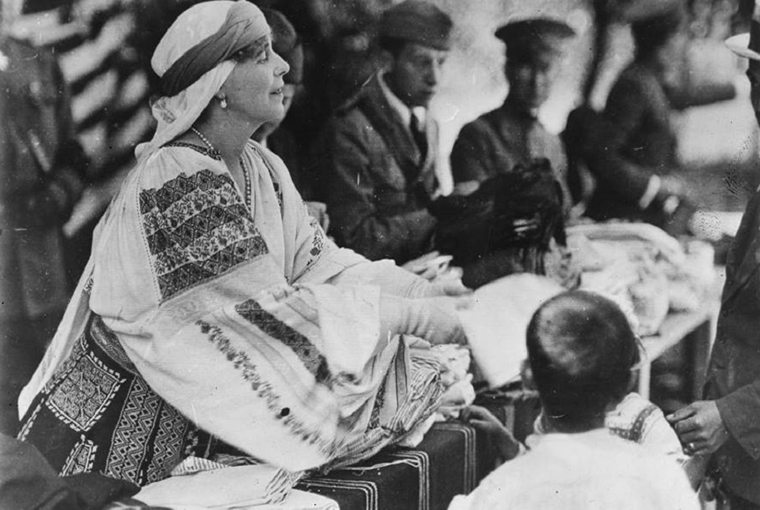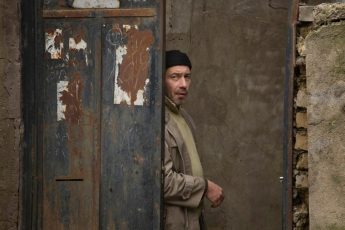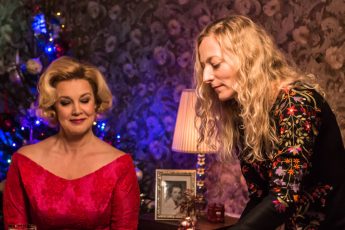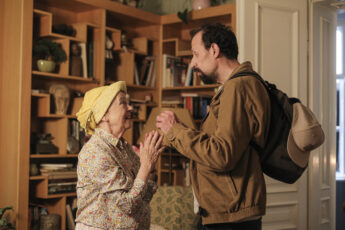Queen of Hearts
Trevor Poots’ Romania’s English Queen (Maria, inima României, 2018)
Vol. 96 (Summer 2019) by Colette de Castro
The British Royal family were an incestuous bunch. But Marie, Princess of Edinburgh, was different. Strong-minded and very self-assured, she refused to marry her cousin George, who would later become George V, King of England. Instead she fell in love with the handsome Ferdinand of Romania, the nephew of Carol I and the future king of Romania. The story of Marie’s courtship and marriage is reconstructed in Trevor Poots’ stylish and rather romanticized recent documentary Romania’s English Queen.
Within the first twenty minutes of this documentary, my dislike set in. One thing that I find cliched is reenacted footage, especially when it involves royalty prancing and close-ups of people’s hands writing letters or diary entries. A woman riding a horse on a mountain is explained to be Marie of Romania, the country’s last Queen and grand-daughter of England’s Queen Victoria. A self-assured voice-over comments on “the woman who changed the history of Romania forever”, as the horse she is riding on rears up, an image which then freezes to the dramatic score and is finally transformed into an old photograph. With its distinctly Anglophone style, I had a suspicion that the film was just another documentary made by an American filmmaker trying to capitalize on a story from European history.
But I soon realized that Romania’s English Queen was no simple affair. It reconstructs a detailed and complex historical background, and the reenacted footage disappeared about 30 minutes into the film. Soon, I was swept up in the passionate and dedicated life of this extraordinary woman. Marie was born into the British Royal Family in 1875 and her life would be a rich and fascinating one. An especially bright girl, she learnt to speak fluent Romanian and took up the local customs. Throughout the First World War she acted as a nurse, working unrelentingly with the wounded soldiers and even riding out onto the battlefield, unafraid and strong-headed. At her coronation ceremony, she wore the traditional peasant clothes of Romania, making them fashionable among a rich elite. Though her marriage to her husband was generally considered to be unhappy, she fell in love with many a passing general who caught her eye. Unrelentingly loyal to Romania, she retained a love for Britain. During the war she convinced Ferdinand to join the Triple Entente and declare war on Germany.
This documentary is especially keen to highlight all these things in as much meticulous detail as possible. It is the work of a true history buff. One gets the impression that study, travel and hundreds of hours of editing have gone into this film. Poots even traveled to Russia to inquire about the missing treasure that has never been returned to Romania. The way she fought for the country is highlighted by articles from journalists or notes from her diary, in which she writes, “My love for my country is my religion.” The director also interviews a lot of pompous old-guard British historians who might look better in the BBC documentary “The Last Dukes”, than here. But when they start talking about Marie, their eyes light up as they recall how she traveled across Europe to gain the support of governments on the question of Transylvania, which Romania wanted to incorporate into its empire. To gain international recognition of Greater Romania she visited Paris alone, where she met with French President Georges Clemenceau and charmed his socks off. One person she couldn’t charm however, was Woodrow Wilson, who was not entranced by tales of fashion and cuisine.
The documentary also highlights some of the vanities of Marie, and how she got her many sobriquets such as “The Most Beautiful Queen in Europe”. Another name, “The Only Man in Romania,” had been given to her when she stood against the signing of the Treaty of Bucharest in 1918.
Though there have already been Romanian documentaries which dealt with this very subject, this one is perhaps the most complete, including never-before seen footage salvaged from the CNC, France’s national film institute (the producer used the Q&A after the screening to encourage filmmaker to try and recuperate such type of footage whenever possible). Though an exclusively Romanian production, director Trevor Poots was born in Belfast and has been working as a producer for television in the UK. After the screening of this film, Poots stated: “I’m surprised Romanians didn’t jump on the opportunity to make this documentary”. But considering Romania’s complicated relationship with their own past, representations of which have often been put into question, perhaps a foreigner needed to be the one to make this particular film.




Leave a Comment